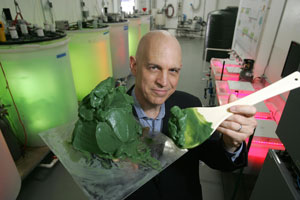
Even though OriginOil has never made money, it continues making plenty of partnership deals.
The company builds machinery and licenses technology to collect oil produced by algae in water. In its latest announcement, the company said May 9 it has signed an agreement with Pace, a Fountain Valley water engineering company, to use OriginOil’s harvesting technology as a way to clean wastewater produced by hydraulic fracturing in Texas oil wells. Pace doesn’t want to make oil from algae.
Riggs Eckelberry, chief executive of OriginOil, said the arrangement was good for his company because it had the potential to generate immediate revenue.
“There is so much money in the oil industry and fracking is a huge topic,” he told the Business Journal. “Now we can monetize our technology in the oil industry and invest that money to develop algae as a replacement for petroleum.”
Since its founding in 2007, the company has made little revenue. In its annual report issued last month, the company, which trades over the counter, stated it had revenue of $180,000 last year and expenses of $5.4 million. It has accumulated a deficit of $17 million, and has $1.8 million in debt payments due this year.
In the latest annual report, the company’s accounting firm expressed “substantial doubt” about its ability to continue as a going concern.
“We may never achieve profitability,” the report stated. “Our ability to continue as a going concern is dependent upon raising capital from financing transactions.”
Eckelberry said a small group of investors has funded OriginOil for years and it continues to back the company, which is in the West Adams neighborhood of Los Angeles and has 10 employees.
“We definitely plan to have strategic partners at some point, but for now we are happy with the support our core shareholders give us,” he said.
All the while, OriginOil continues making deals.
Floating bags
On May 3, the company announced an agreement with Algasol Renewables, a Baleares, Spain, company that has developed floating bags that function as photo bioreactors to produce oil-bearing algae. OriginOil will combine its harvesting technology with the bags to allow large-scale production of oil in salty water. Algasol will try to sell the system to large chemical and agricultural companies in South America that want to produce algae oil.
In March, OriginOil announced a venture with a French manufacturer to produce a small harvester that processes about a gallon of algae-laden water per minute to make oil. The idea is to let algae farmers try OriginOil on a limited scale before ordering larger machines. The small harvester will cost about $50,000.
In December, the company announced a cooperative research agreement with the Department of Energy’s Idaho National Laboratory to develop standards for algae as a “step toward making algal biofuels a competitive alternative to petroleum,” the company said in a press release.
John Benemann, president of alternative energy consulting firm Benemann Associates in Walnut Creek, believes commercial-scale production of oil from algae won’t happen in the next five years, and even 10 years is a question mark. In addition, many companies are competing for investment dollars in the algae industry and their numbers are growing.
“In the U.S., the number of companies in algae is well over 100 with new ones popping up every day,” Benemann said. “Only a handful have gotten significant funding, meaning more than $1 million.”
For OriginOil, investment dollars have sustained the company since its 2007 founding.
Will Thurmond, chief executive at investment consultancy Emerging Markets Online in Houston, said in a report last year that algae companies are signing partnerships with large industrial companies. He cited Synthetic Genomics in La Jolla, which has a $600 million commitment from Exxon Mobil Corp. in Irving, Texas, and San Diego’s Sapphire Energy, which drew more than $100 million from Bill Gates’ Cascade Investments and other investors.
Eckelberry said those companies are trying to become large algae producers and are potential customers to license his technology.
“We are making sure that in the algae space we are working with partners who have growth systems in place,” he said.
The goal remains to get listed on Nasdaq or another exchange when the time is right.
